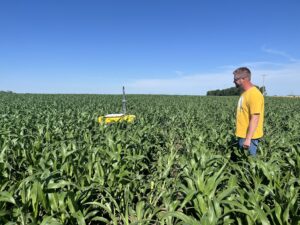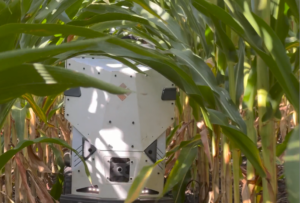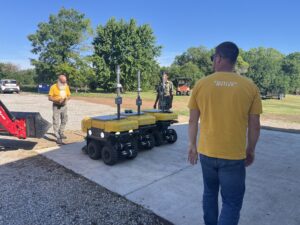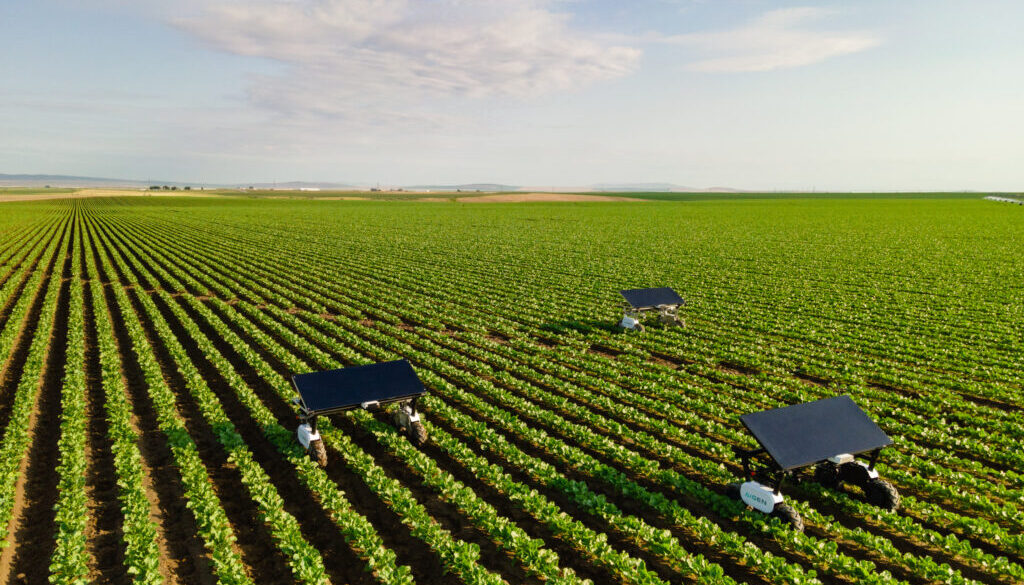In bid to slash chemical use, robots take on farm fields
Cheney, Kan. – On a sweltering summer day in central Kansas, farm fields shimmer in the heat as Clint Brauer watches a team of bright yellow robots churn up and down the rows, tirelessly slicing away any weeds that stand in their way while avoiding the growing crops.
The battery-powered machines, four feet long and two feet wide, pick their way through the fields with precision. Programmed with myriad data points about the field, the artificial intelligence (AI)-driven bots run without any human hand to guide them.
Brauer, a former California-based tech executive who moved back to his family farm in central Kansas after his father developed Parkinson’s disease, sees the robots as critical tools to help farmers reduce their reliance on chemicals and be more protective of their health and the environment.
His Greenfield agricultural technology company now builds and programs its robots in a shed behind an old farmhouse where his grandmother once lived. Farmers who hire the robots are charged a flat rate per acre weeded. Twenty farmers are signed up for the robotic services this season, and the company hopes to weed 5,000 acres this year.
“The answer is here,” he said. “This solves a lot of problems for farmers.”

A “personal mission”
Greenfield is one of many agricultural robotic companies springing up amid a confluence of concerns over the future of farming. Fears about the harmful impacts of farm chemicals on the environment and on public health are key drivers, as is the need to deal with the diminishing effectiveness of overused weed killing chemicals, labor shortages, and the high costs that farmers face with conventional farming practices.
Financial backing is flowing to these companies from venture capital funds, private investors and large food and agricultural companies eager to make bets on the bots as a means to promote more sustainable food production – a notion increasingly finding favor with consumers.
The investment arm of Chipotle Mexican Grill, a global restaurant chain, is among Greenfield’s investors. Christian Gammill, who leads Chipotles venture fund, said Greenfield’s work is “important and impactful.” Greenfield has raised about $12 million in capital, and is seeking more, according to Brauer.
ReGen Ventures, a venture capital fund operating in Australia and the US, has so far sunk $6 million – with more planned – into North Dakota-based Aigen Robotics, which uses AI and camera vision to sense plants and remove weeds while avoiding crops. Aigen declares on its website to be “building a future with no harmful chemicals in our food.” The compact robots are powered via solar panels fixed to the top of each machine and are designed to work autonomously, sleeping and waking up on farm fields.
“They are well on their way to displacing chemicals from ag and enabling a new, regenerative food production system,” said ReGen founder Dan Fitzgerald.
Aigen co-founder and CEO Kenny Lee, who previously worked in cyber security, said he and partner Richard Wurden, who worked in the electric vehicle industry, are on a “personal mission” to reduce herbicide use in farming. Lee is a survivor of non-Hodgkin lymphoma, a disease the International Agency for Research on Cancer has found can be caused by glyphosate-based weed killers, such as the popular Roundup brand.
“The reason we have herbicides in our food is because of the weeds,” Lee said. “So we started talking to farmers about how we could help them spray less. We went on a journey to find the most economical, climate-friendly means to help farmers and reduce chemical needs.”
In addition to weed control, Aigen robots collect plant data for farmers to use in making decisions related to productivity.
The company has raised $19 million to date and is deploying 50 robots this summer in sugar beet fields in the US Midwest, aiming to grow its fleet to 500 for use with an expanded array of crops.
Even the global agrochemical company Bayer, which sells Roundup herbicides, is taking an interest in robots for farms, as a potential solution to help farmers control weeds and tackle other tasks. The company says it is looking at “all available solutions, including robotics,” to help farmers control weeds as the company aims to reduce the environmental impact of its products.

A centuries-old fight
Farmers have been fighting weeds in their fields – pulling, cutting, and killing them off with an array of tools – for centuries. Weeds compete with crops for soil moisture and nutrients and can block out sunlight needed for crop growth, cutting into final yields. Over the last 50-plus years, chemical eradication has been the method of choice. It is common for farmers to spray or otherwise apply several weed killing chemicals onto their fields in a single season.
But as chemical use has expanded, so has scientific evidence that exposure to the toxic substances in weed killers can cause disease. In addition to glyphosate’s link to cancer, the weed killing chemical paraquat has been linked to Parkinson’s disease. Another common farm herbicide, atrazine, can be harmful to reproductive health and is linked to several other health problems.
Weed killing chemicals have also been found to be harmful to the environment, with negative impacts on soil health and on pollinators and other important species. The widespread use of herbicides in farming has also fueled weed resistance, leaving many farmers struggling to control weeds in their fields even with repeated applications of herbicides.
And while some companies are developing chemical-free robotic weed interventions, others are rolling out farm robots designed specifically to spray herbicides in ways that are more precise than conventional methods, according to developers.

Using robots to address weed problems is only one chore that can be handled by the AI-driven machines. EarthSense, another company emerging in the agricultural robotics arena, offers robots that scan and analyze key field information, and can use AI precision technology to fertilize fields and/or plant cover crops, among other tasks.
The company has sold 150 robots to date, with the most expensive offering priced at $25,000, said co-founder Chinmay Soman. The company has yet to break even but should be “significantly profitable by the end of 2025, according to Soman.
“EarthSense is creating this new class of smarter agricultural equipment that can do more biodiverse, more ecologically sound agriculture, that is profitable and is beneficial to people on the planet,” Soman said.
EarthSense has received funding from the National Science Foundation, and partnered for technology development with the University of Illinois and the US Department of Energy. It lists among its “partners and accelerators” the John Deere Co. and Microsoft. Several large seed and agrochemicals companies are customers, according to Soman.
Organic farmer Jacob Landis, who manages about 1,400 acres of corn, soybeans, wheat and other crops and milks about 60 dairy cows in northwest Illinois, said he welcomes the efficiency that comes with the new technology. He installed a robotic milker about eight years ago and thinks that using robotic intelligence for weed control and to gather important metrics about his fields and crops would allow him to “become a better farmer.”
He wants to see autonomous options accessible for small farmers – those managing under 1,000 acres, and not just large players.
“Yes, I currently cover every inch of every field while planting, harvesting, or doing weed control. But I don’t have any time to actually WALK my fields,” he said. Farmers using autonomous robots for weed control and other tasks could gain deeper insights into their soils and plants and focus on the “ecological care” of their farms, he said.
Skeptics
Many farmers and academic experts are skeptical that farm robots can make a substantial difference. They say that there is simply too much farmland and too many diverse needs to be addressed by robots that are costly to make and use. The better path, many say, is for farmers to work with nature, rather than against it. The model of regenerative agriculture – using a variety of strategies focused on improving soil health, including limiting pesticides, rotating crops, planting crops that provide ground cover to suppress weeds, and avoiding disturbing the soil – is the better path, they say.
“I think the robots can be a useful tool as part of an integrated weed approach, but using as a single tool… is probably not going to work that well,” said Adam Davis, a professor and head of the University of Illinois Department of Crop Science.
Wisconsin farmer Ryan Erisman agreed. “The robot weeders represent another round in the arms race against nature,” he said. “So many of our agricultural tools are really weapons… that we use against perceived threats. When we keep running into the same problem year after year or season after season, it’s not our tools, our techniques, or our technology that needs reworking. It is our failure to understand the system we are working in and our relationship to it.”
Despite the naysayers, Kansas farmer Torrey Ball is eagerly awaiting his turn for Greenfield’s robotic fleet. Last year, the company’s robots weeded his sunflower fields. This month they’ll weed some of his soybean acreage. Ball is a longtime user of many of the leading weed killing herbicides and knows first-hand how expensive and how ineffective some products have become as weeds have developed resistance to the widely used chemicals, particularly glyphosate. He also knows of the research showing the risks to human health, and he worries what the chemicals are doing to water quality.
Ball only runs the robots on a small portion of his 2,000-acre farm for now, but hopes one day they may help him break free of chemical dependency on all his land.
“If we can use less chemicals I’m all for that,” Ball said. “We’re going to try and leave the ground in better shape than what it was when we took it over, which is hopefully everybody’s goal.”
(Featured image of Aigen solar-powered robotic rovers provided by Aigen.)
 EWG
EWG


